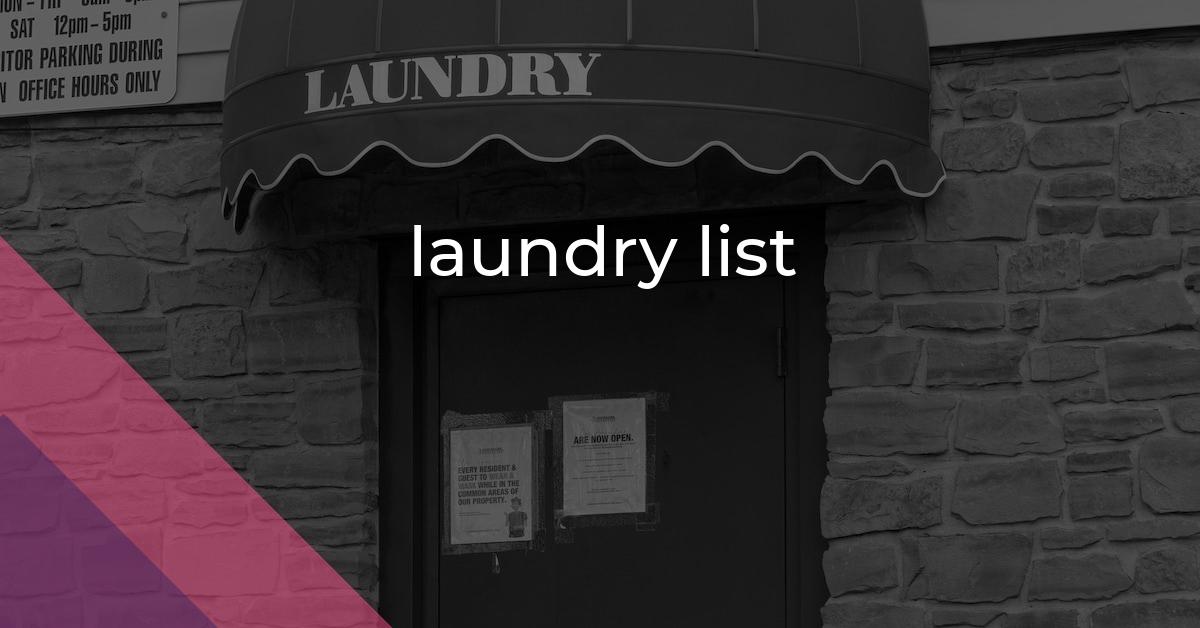laundry list: Idiom Meaning and Origin
What does ‘laundry list’ mean?
The idiom "laundry list" refers to a long or extensive list of items, tasks, or problems, often overwhelming or tedious to deal with.

Idiom Explorer
The idiom "last thing one needs" refers to something that is not wanted or desired, an additional burden or problem that comes at an inconvenient time or adds more stress to an already difficult situation.
The idiom "juggling act" refers to the skill or challenge of managing multiple tasks or responsibilities simultaneously. It implies a delicate balance and careful coordination.
The idiom "in the weeds" means being overwhelmed or swamped with work or tasks, typically to the point of being unable to keep up or falling behind.
An idiom meaning to do something quickly and efficiently, often describing the completion of multiple tasks or actions in a single swift and decisive motion.
The idiom "in detail" means to explain or describe something thoroughly or with great attention to specific information or facts.
An idiom meaning a controversial issue or situation that is difficult to handle, and often passed quickly from person to person to avoid dealing with it.
The idiom "honey do list" refers to a list of tasks or chores that a person's spouse or partner asks them to do. It implies that these tasks are typically small or mundane in nature.
The idiom "heavy lifting" refers to the difficult or hard work needed to accomplish a task or achieve a goal.
The idiom "have one's hands full" means to be very busy or have a lot of work or responsibilities to deal with.
Unraveling Explanations
The idiom "laundry list" is a commonly used expression in the English language. The phrase originally stems from the practice of making a list of items to be included in one's laundry. While the idiom has taken on a broader meaning over time, it continues to retain its connection to the idea of a detailed list.
One key feature of the idiom is its association with a lengthy or extensive list. It is often used to describe a series of items, tasks, or issues that are numerous and require careful attention or consideration. The idiom emphasizes the length and sometimes the tediousness of the list, highlighting the potential difficulty in dealing with such a large number of items.
The idiom "laundry list" gained popularity in the mid-20th century and has since become a common phrase in both spoken and written English. It is regularly utilized in a variety of contexts, ranging from everyday conversations to formal writing. The idiom is particularly prevalent in business, politics, and bureaucratic settings, where complex issues and substantial agendas often necessitate the use of detailed lists.
Furthermore, the idiom "laundry list" often implies the need for organization and prioritization. When faced with an extensive list of tasks or issues, individuals are encouraged to approach the list in a systematic and efficient manner. The idiom emphasizes the importance of sorting through the items, categorizing them, and determining the order in which they should be addressed.
It is worth noting that the idiom "laundry list" is used metaphorically. The connection between a list of laundry items and a list of tasks or issues lies in the concept of sorting and completing tasks. The idiom combines the literal meaning of a list with the figurative representation of accomplishing various tasks, highlighting the need for careful consideration and organization in both situations.
The idiom "laundry list" conveys the idea of a detailed and often lengthy list, typically used to describe a series of tasks, issues, or items. Its origin lies in the practice of making a list of laundry items for cleaning, yet over time, it has broadened to encompass a broader range of topics. The idiom highlights the need for organization, prioritization, and attention to detail when dealing with extensive lists, emphasizing the potential challenges and importance of managing multiple tasks or issues.
The related phrase "honey do list" has a similar concept to a laundry list. It refers to a list of tasks or chores that one's partner or spouse would like them to complete. Just as a laundry list emphasizes the need for organization and completion of tasks, a honey do list also encourages individuals to tackle various chores in a systematic and efficient manner.
In addition, the phrase "dirty laundry" is another idiom related to the concept of a laundry list. It is often used metaphorically to refer to personal or private matters that should be kept confidential. Similar to the way a laundry list contains specific items that are, in a sense, personal to the individual, the phrase "dirty laundry" suggests that certain aspects of one's life or experiences should not be shared openly.
Another idiom that can be connected to a laundry list is "heavy lifting." This phrase typically refers to the difficult or labor-intensive part of a task or project. Just as tackling a laundry list may involve physically sorting and organizing clothes, "heavy lifting" represents the initial challenging work that needs to be done before the rest of the project can progress smoothly.
The idiom "bucket list" is also related to a laundry list. However, while a laundry list typically consists of tasks or items that need to be completed, a bucket list consists of experiences or goals that an individual hopes to accomplish or enjoy during their lifetime. Both lists involve the idea of compiling a set of things to do, but a bucket list focuses more on personal aspirations and dreams.
Lastly, the phrase "fire hose" is another idiom that can be associated with a laundry list. It is often used to describe a situation or an overwhelming amount of information that is difficult to process or handle. Just as tackling a laundry list with numerous tasks can feel overwhelming, being bombarded with a "fire hose" of information can be equally challenging to manage.
Example usage
Examples of how the idiom "laundry list" can be used in a sentence:
- She handed me a long laundry list of tasks to complete before the end of the day.
- The politician presented a laundry list of promises during his campaign speech.
- I have a laundry list of items to buy at the grocery store tomorrow.
More "Classification" idioms



